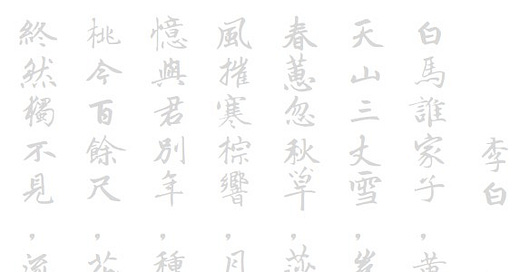Out of Sight: Li Bai's All-seeing Eye
Li Bai's vision encompasses the front line and the home fires
Out of Sight
Li Bai
.
Who is that white knight? A son of what great clan?
In this brown border town, everyone is an army man.
"You can't get home this winter, there's ten feet of snow on Tianshan…"
Then spring orchids faded at West Pool, and the autumn crickets began,
And the moon frosted my bedroom's gloom, and again the winter looms sang.
We planted this peach, you and I, when my eyebrows marked out its height,
Since you left, it grew a hundred feet high, then withered and folded tight.
So useless of me to cry, but you are always out of sight.
Out of Sight was a title used by many poets, all writing on the theme of a woman missing her husband who has been away for many years. This may be because he loves another, or is away at war, or has gone to work for the emperor. Only one poem with this title was judged good enough to be included in the 300 Tang Poems, but the Complete Tang Poems includes nine with this title, and they form a fascinating series, dating back to the 6th century, before the beginning of the Tang.
Often, the title of a poem gave name of the tune to which it should be sung. However, that doesn't seem to be the case for Out of Sight: some of the poems are very short, while others are medium length; some use short lines, others long. Instead, the poems are linked by two themes: the loneliness of a woman whose husband is away, and rich lifestyles. Both themes are brought out most clearly by Shen Quanqi in the single Out of Sight poem collected in the 300 Tang Poems.
Li Bai's (701-762) version of this theme is unusual for its roving viewpoint: he begins out on the frontier, looking at the husband, stuck far from his wife. His sense of the intimate and romantic is beautifully illustrated in the detail of a tree that comes up to the wife's eyebrows. To modern readers, this comic, playful image is also an uncomfortable reminder of just how young girls were when they married during the Tang.
The "winter looms" refers to the clattering of home looms in the villages during autumn, as farming households made the warm clothes they would need to see them through the winter.
李白 独不见
白马谁家子,黄龙边塞儿。
天山三丈雪,岂是远行时。
春蕙忽秋草,莎鸡鸣西池。
风摧寒棕响,月入霜闺悲。
忆与君别年,种桃齐蛾眉。
桃今百馀尺,花落成枯枝。
终然独不见,流泪空自知。




Rereading this, I think I'm going to modify the fifth couplet: In Chinese, eyebrows are a symbol of feminine beauty, so the image is sexy as well as being playful. We can recreate that in English by using a different part of the face:
Who is that white knight? A son of what great clan?
In this brown border town, everyone is an army man.
"You can't get home this winter, there's ten feet of snow on Tianshan…"
Then spring orchids faded at West Pool, and the autumn crickets began,
And the moon frosted my bedroom's gloom, and again the winter looms sang.
We planted this peach, you and I, and my lips were exactly its height,
Since you left, it grew a hundred feet high, then withered and folded tight.
So useless of me to cry, but you are always out of sight.